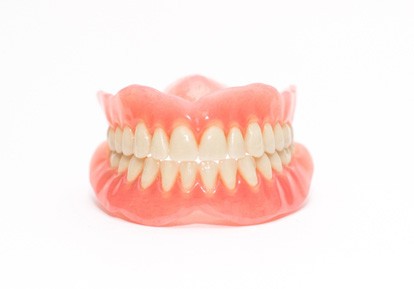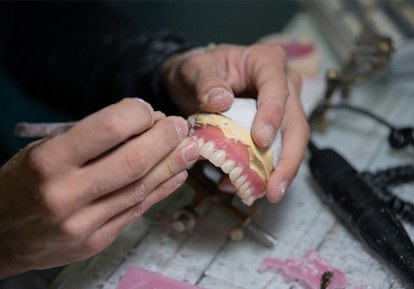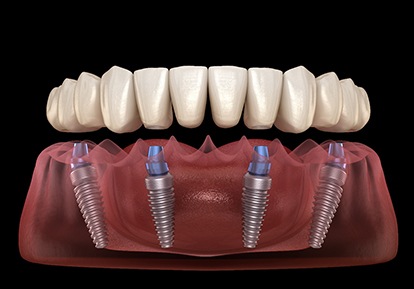Dentures – Plainview, NY
Restore Your Smile and Biting Power

Are you missing most or all of your teeth? Do you find yourself wishing you could enjoy your favorite foods again? Do you avoid saying certain words because you know they will give you difficulty? Sounds like it’s time to try dentures in Plainview. These prosthetic teeth allow us to easily restore your smile and biting power back to their former glory. Contact us today to schedule a consultation to learn whether full, partial, or implant dentures are right for you.
Why Choose Meadowbrook Dentistry for Dentures?
- Capable of Being Paired with Dental Implants
- Designed Using Advanced Dental Technology
- Created with Natural-Looking Materials
Who’s a Good Candidate for Dentures?

If you’re missing all of your teeth on one or both arches, you would be an excellent choice for a full denture. Whether your teeth were lost due to malnutrition, periodontal disease, or some other unfortunate circumstance, full dentures are here to help restore your smile to what it used to be.
On the other hand, if you’re only missing most or a few of your teeth, you would be a good candidate for partial dentures in Plainview. They can help give you the appearance and function of a full smile. Ahead of your consultation, our team will evaluate your smile and review your medical background to assess your suitability for the treatment. In the meantime, here are some factors to consider as you prepare for your appointment.
Effects of Missing Teeth

Understanding the causes and consequences of missing teeth is essential before embarking on any treatment. According to the American College of Prosthodontists, common reasons for tooth loss include decay, gingivitis, accidental trauma, and poor oral hygiene. Additionally, certain systemic conditions may heighten the risk of tooth loss.
If you're missing one or more teeth, prompt replacement is crucial to avoid potential complications. Delaying replacement can lead to various negative impacts on your smile, including difficulty eating or speaking, facial changes, and diminished self-esteem. Moreover, serious effects like gum recession, neighboring teeth shifting, and jawbone deterioration may occur if gaps are left untreated.
What Qualifies You for Dentures?

Whether you're dealing with minor or extensive tooth loss, dentures offer a viable solution. This tried-and-true treatment has provided relief to countless patients over the years, restoring confidence in eating, speaking, and smiling. However, if you have underlying issues such as gum disease or tooth decay, addressing them beforehand is crucial. Additionally, maintaining a healthy jawbone is essential to prevent issues like poorly fitting dentures and gum irritation.
The type of denture recommended will be tailored to your specific needs, based on the extent of tooth loss. Our team typically suggests partial, full, or implant dentures, depending on your unique circumstances. A significant benefit of this treatment is its affordability compared to other options, making it an ideal choice for those on a budget.
Alternative Tooth-Replacement Options

If traditional dentures aren't the right fit for you, there are alternative treatments available to address your missing teeth. Consider exploring these options:
- Dental Bridges – Ideal for patients with one or more consecutive missing teeth, dental bridges utilize pontics to span the gap, anchored by dental crowns affixed to adjacent natural teeth on either side.
- Dental Implants – This involves the surgical placement of titanium posts into the jawbone to provide a sturdy foundation for new teeth. Dental implants offer exceptional stability and functionality, but they require adequate jawbone density and healthy gums for successful integration. While it involves a minor surgical procedure, the results can endure for decades with proper maintenance.
What Are the Different Types of Dentures?

Tooth loss comes in various forms with patients missing one tooth or an entire arch. Fortunately, there are multiple options that will help you achieve the complete, functional, and beautiful smile you deserve.
Partial Dentures
Partial dentures are best for those who are only missing a few teeth in a row. These artificial teeth are created using an acrylic, gum-colored base and are connected by a metal framework that snakes behind your remaining natural teeth to hold them in place. Usually, partial dentures are completely removable and can look and feel much more natural than a dental bridge.
Full Dentures
When you think of the word “dentures,” you probably think of full dentures. These are an entire set of prosthetic teeth attached to an acrylic base that matches the color of gum tissue. Once inserted into your mouth, they are held in place by denture adhesive and/or your natural suction to give you back your smile and biting power.
Implant Dentures
For a more permanent and stable prosthetic, implant dentures are an ideal solution. Held into place by the jawbone, they are surgically implanted and offer full functionality when eating and speaking. They also deliver continuous stimulation to the bone, reducing the risk of possible facial collapse. Implant dentures are also designed to last 30 years or even a lifetime with proper maintenance.
How Dentures are Made

Since you will be relying so heavily on your dentures for speaking and eating, a great deal of care needs to be put into making them to ensure that they fit comfortably and function properly. Many of our patients are curious about what it will take to create their new dental prosthesis. In order to satisfy that curiosity, we have provided a step-by-step overview of how dentures are made down below.
What are Dentures Made Of?

Every denture consists of a base and a number of artificial teeth. Here’s a quick look at what these components are typically made out of.
- The base can be made from a variety of materials. Acrylic is the most popular option since it can be customized to resemble your natural gums. Nylon might be used in place of acrylic in specific circumstances.
- The artificial teeth may be made out of resin or porcelain. Generally speaking, many dentists prefer porcelain due to the way it mimics the appearance of real tooth enamel. On top of that, artificial teeth made out of porcelain can generally be trusted to last a very long time.
The Denture Creation Process

Your denture will be personalized for your specific mouth. There are several steps involved in creating a customized prosthesis, as detailed below:
- At the start of the process, you will pay our office a visit so that we can take impressions of your upper and lower gums. A plaster model of your mouth will be created and sent to a laboratory.
- The model of your mouth will be used as a guide to create a wax version of your gums. Then a device called an articulator will be used to place the artificial teeth in specific spots in the wax. Once the wax base has been adjusted, it will be sent to our practice.
- At a second appointment, we will check to make sure the wax dentures fit in your mouth. Once we have confirmed that they do, we’ll return them to the lab so that the process can be completed.
- The dentures are placed in a flask, which is filled with plaster and exposed to hot water. The heat will melt the wax, but the plaster will allow the dentures to keep their shape.
- Acrylic is injected into the flask. The material will replace the wax in order to act as the new base for the dentures.
- Special tools are used to get rid of the plaster, and unnecessary acrylic is removed from the dentures.
- The now-completed dentures are sent back to our office so that we can perform the final fitting, allowing you to start enjoying your new teeth.
Adjusting to Your New Dentures

While your dentures will be made with your comfort in mind, your mouth will need time to get used to them, so you may experience a bit of soreness at first. Exercising your facial muscles and eating soft foods can help ensure that the adjustment process goes smoothly and relatively quickly. If you have any questions about the adjustment process, don’t hesitate to let our team know.
The Benefits of Dentures

Whether you’ve lost most or all of your teeth, having gaps throughout your smile can lead to a dramatic decline in self-confidence, desire to socialize, and even your ability to properly digest and chew food. We want all of our patients to get the most out of life, and that includes having complete function and control of your smile. Dentures offer a wide range of life-changing benefits. Start your transformative journey today by learning how this treatment can benefit you!
Psychological Benefits

Missing teeth can have a deep psychological impact that can spread to other areas of your life, affecting your self-confidence, happiness, and desire to socialize. This dental concern has also been connected to social anxiety and depression.
Thanks to dentures’ ability to rejuvenate your smile, you’ll be able to laugh, grin, and speak with confidence again, helping you get more out of life.
Clearer Enunciation

With missing teeth, pronouncing certain words or sounds can become a challenge. This is because your tongue can easily become stuck in the holes throughout your mouth, causing you to slur or trip over your words. With a short adjustment period of about 30 days after getting dentures, you’ll be able to speak much more easily, boosting your confidence in social settings.
Improved Nutrition

Chewing food effectively takes an entire mouth full of teeth, and when many or all of them are missing, proper digestion and absorption of key nutrients can be incredibly difficult to achieve. Some people experiencing tooth loss even develop indigestion and malnutrition. With a restored set of teeth, you’ll be able to eat a wider variety of foods, helping you consume key nutrients to maintain good oral and overall health.
Preservation of Oral Health

If you have gaps throughout your arch, your existing nearby teeth will eventually shift to fill in these spaces. This can lead to bite misalignment, misspacing, and jawbone resorption. With time, these secondary conditions can result in further tooth loss. Whether you receive full or partial dentures, a complete set of teeth will make it easier to maintain a healthy smile.
Expanded Opportunities

When you first meet someone on a blind date or sit down with a recruiter during a job interview, the first trait that they’ll likely notice is your smile. If you’re missing several or all of your teeth and don’t feel confident enough to let it show, it could come off as cold or unwelcoming, limiting your ability to establish a great first impression. With a complete set of pearly whites, you can let your smile show with confidence in these important moments.
Understanding the Cost of Dentures

Because every person is unique, the cost of dentures in Plainview can vary greatly from patient to patient. The best way to learn the price of replacement teeth is to schedule a consultation with one of our expert dentists. They will carefully examine your mouth and any remaining teeth and discuss the factors that will influence the cost of your dentures. To get an idea of some of these factors before your initial visit, keep reading below.
Factors That Affect the Cost of Dentures

There are three major factors that influence the cost of dentures:
- Preparation: Remaining teeth may need to be extracted before getting dentures.
- Base Material: The type of acrylic used for the base, which is dyed to match the color of gum tissue.
- Teeth Material: The replacement teeth, usually made from acrylic or porcelain, should be lifelike and sturdy.
Are Implant Dentures More Expensive?

Yes. In general, implant dentures are more expensive than traditional dentures – but for good reason. Implant dentures offers a range of benefits that traditional replacement teeth just cannot match. Because dental implants fuse directly with the jawbone, implant dentures have greater stability and a more natural appearance than traditional dentures. Implant dentures restore nearly full chewing power and never slip or shift, which means you can enjoy all your favorite foods. Finally, implant dentures often make more financial sense in the long run thanks to their long-lasting nature. While traditional dentures typically must be replaced every 5 to 7 years, implant dentures can last for decades with proper care.
Does Dental Insurance Cover Dentures?

You can likely count on your dental insurance to cover around 50% of the cost of dentures. However, every insurance plan is slightly different. Before committing to restoring your missing teeth with dentures, don’t hesitate to check with your insurance provider to confirm your coverage. Our knowledgeable denture dentists in Plainview will be happy to help you understand the details of your insurance plan and maximize your benefits.
Other Options for Making Dentures Affordable

Even if you don’t have dental insurance, there are plenty of ways to make dentures work for your budget. For example, at Meadowbrook Dentistry, we offer an in-house discount plan! For as low as $25 a month, you get many of the same benefits as a traditional insurance plan without any of the hassles. No deductibles, copays, waiting periods, et cetera! Instead, you’ll get easy access to free preventive care like checkups and cleanings and a 20% discount on major services like dentures in Plainview.
Qualified patients can also save on dental restorations by signing up for CareCredit or Proceed Finance. Both of these trusted partners allow patients to break up the out-of-pocket costs of dental care into small, manageable monthly payments. Many of their plans have low or no interest, which make them a great way to achieving your smile goals without straining your budget.
At Meadowbrook Dentistry, we believe finances should not stand in the way of a complete, healthy smile. Our team will be happy to discuss different payment and financing options for dentures during an initial consultation.
Dentures Aftercare

Undoubtedly, you can trust dentures to make your grin look and work better. (Patients wouldn’t get them otherwise.) That said, these prosthetic teeth still need regular maintenance. They won’t be helpful to your smile if they don’t get proper upkeep. Quite the opposite, in fact – they’ll start to fail and cause various oral issues. Of course, we at Meadowbrook Dentistry can help: below are some excellent tips on caring for dentures. To ensure your restoration lasts long, try giving them a read.
Removeable Dentures

Remove After Eating
Firstly, you’d be wise to rinse your dentures after each meal. Doing so keeps leftover food and plaque from clinging to them. Consequently, you’ll have a lower risk of oral health issues.
Note, though, that you shouldn’t use hot water for the rinses. Liquids at high temperatures can warp denture material. As such, a steamy rinse would distort your denture’s fit.
Clean Your Restoration
Aside from rinsing them, clean your dentures (at least) once daily as well. This habit removes the bacteria and debris that a post-meal wash can miss.
A daily denture cleaning is pretty simple. Once they’re out of your mouth, just brush the prosthetics with a soft-bristled toothbrush and some hand soap. Don’t involve toothpaste in the process, as it’s abrasive and can damage dentures.
After the brushing, briefly soak the dentures in a cleansing solution. Then, rinse them before putting them back in your mouth.
Keep Your Dentures Safe
Sadly, dentures aren’t invincible. They can break if they’re put under enough force. Therefore, you should take steps to keep them safe.
Thankfully, it isn’t too hard to protect dentures. You could place a towel in the sink for daily cleanings; it’d cushion the prosthetics from falls. On the other hand, you might store the dentures securely when they’re not in use. Then, kids or pets wouldn’t reach and break them.
Remove Dentures When You Sleep
While they may look natural, you shouldn’t wear dentures overnight. The better approach is to remove them before bed. If possible, put them in a glass of soaking solution; the material keeps dentures moist while you sleep.
You see, wearing dentures to bed is harmful. It restricts your gums’ circulation, resulting in soft tissue irritation. Constant denture use also increases your tongue’s plaque levels, not to mention your pneumonia risk.
Notice Changes
As you wear dentures, monitor both the prosthetics and your mouth. You’ll need to watch for changes your dentist may need to address. If you develop mouth sores, gum irritation, or an infection, you must get immediate care.
Remember to see a dentist if your dentures fit poorly or get damaged. Trying to fix them yourself won’t help matters. In contrast, a dentist can refit or even replace the restorations.
All-on-4 Dentures

Due to using dental implants, All-on-4 dentures have their own unique care steps. These are:
- Mouth Rinses – Rinse your mouth with mouthwash daily to prevent tartar growth.
- Clean Between Spaces – To clean between your dentures and gums, use a sulcus brush. (This kind only has one-third the width of normal toothbrushes.)
- Twice-Daily Brushing – As you would natural teeth, brush your dentures twice daily with a soft-bristled toothbrush and appropriate toothpaste.
- Once-Daily Flossing – Floss your replacement teeth once daily. If needed, get floss threaders to floss beneath your dentures.
Dentures FAQs

Replacing missing teeth is an important step to regaining your smile and your confidence. But you may have questions before you start treatment. We welcome your inquiries and will address your concerns during your consultation. During that appointment, we can also talk about your needs and goals, the options for replacement, and the cost associated with each choice. Please take a look at the responses below, and don’t hesitate to ask us if you need more clarification or have other questions about dentures in Plainview.
What Is the Process of Getting Dentures?
After we’ve had your consultation, we may need to take care of some preliminary work, such as tooth extraction, implant placement, or gum disease therapy. When that is complete, we will collect impressions of your upper and lower teeth and send this information to our trusted dental lab. Then, you will come in for a fitting to make sure the dentures fit properly. If necessary, the restorations may go back to the lab for further adjustments to ensure the perfect fit.
Does Attaching Dentures to Implants Really Make a Difference?
Dental implants make a huge difference when it comes to dentures. Although modern dentures fit better than ever before, nothing beats the stability and strength implants can give your replacement teeth. Anchored to implants, your dentures enable you to eat basically whatever food you’d like. Plus, you don’t have to worry about your teeth slipping out of position, helping you feel even more self-confidence. With this stability, you can have a more nutritious, healthier diet, which can improve your quality of life!
How Long Do Dentures Last?
The lifespan of traditional dentures is usually about five years before a new set is needed. Before then, you may need an adjustment or two to keep the dentures fitting properly. Implant dentures, however, can last for more than 25 years before needing to be replaced. Keep in mind that how well and how long your dentures perform is also greatly dependent on how well you take care of them. If you follow our care instructions on a daily basis, your new teeth can last as long as possible! Plus, when you come to our office for checkups, we can make you’re your dentures still look and work at their best.
Are Dentures Covered by Dental Insurance?
Although there are some exceptions, most dental insurance plans include coverage for part of the cost of dentures. In fact, the typical amount is about 50 percent. Taking advantage of your insurance benefits allows you to save on your out-of-pocket expenses, but even if you don’t have dental insurance, you can apply for low-interest financing with CareCredit. This option breaks up the total into monthly payments that may be easier to handle than a one-lump sum.

